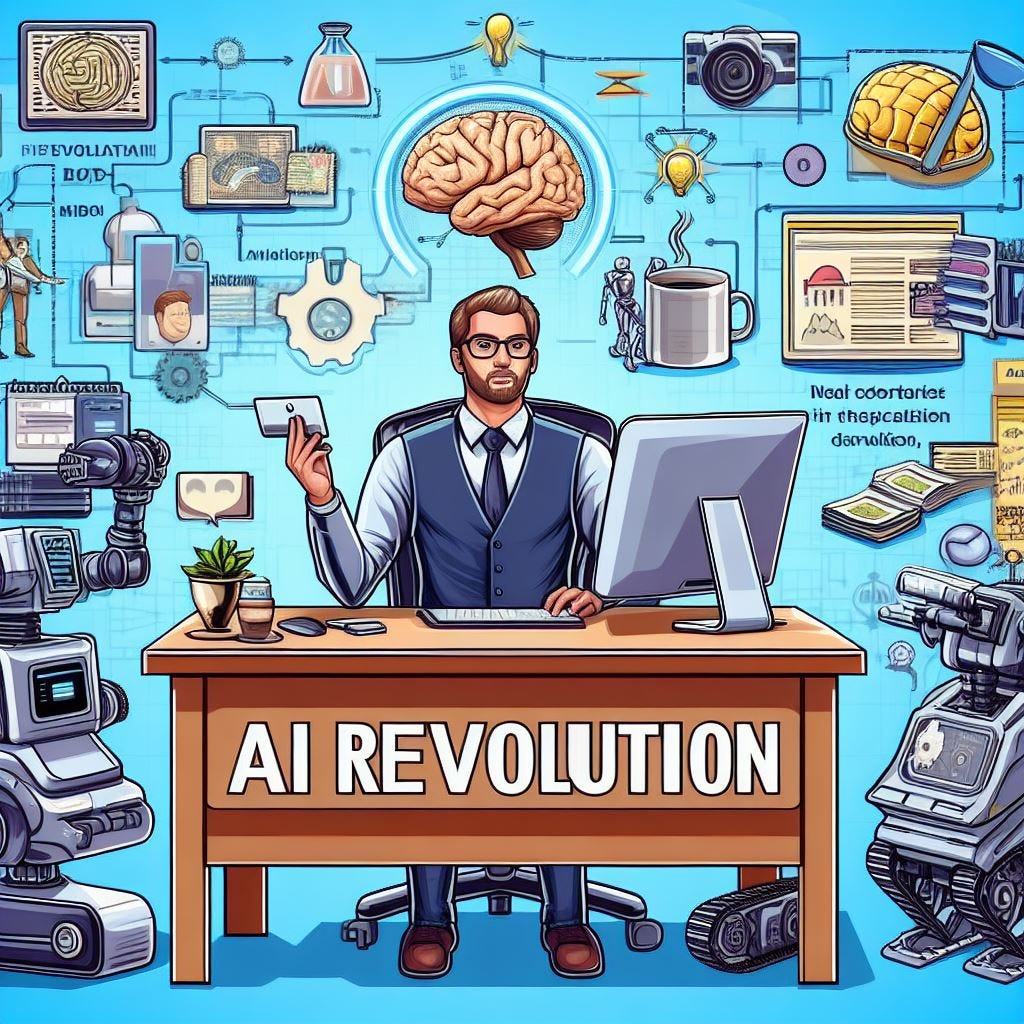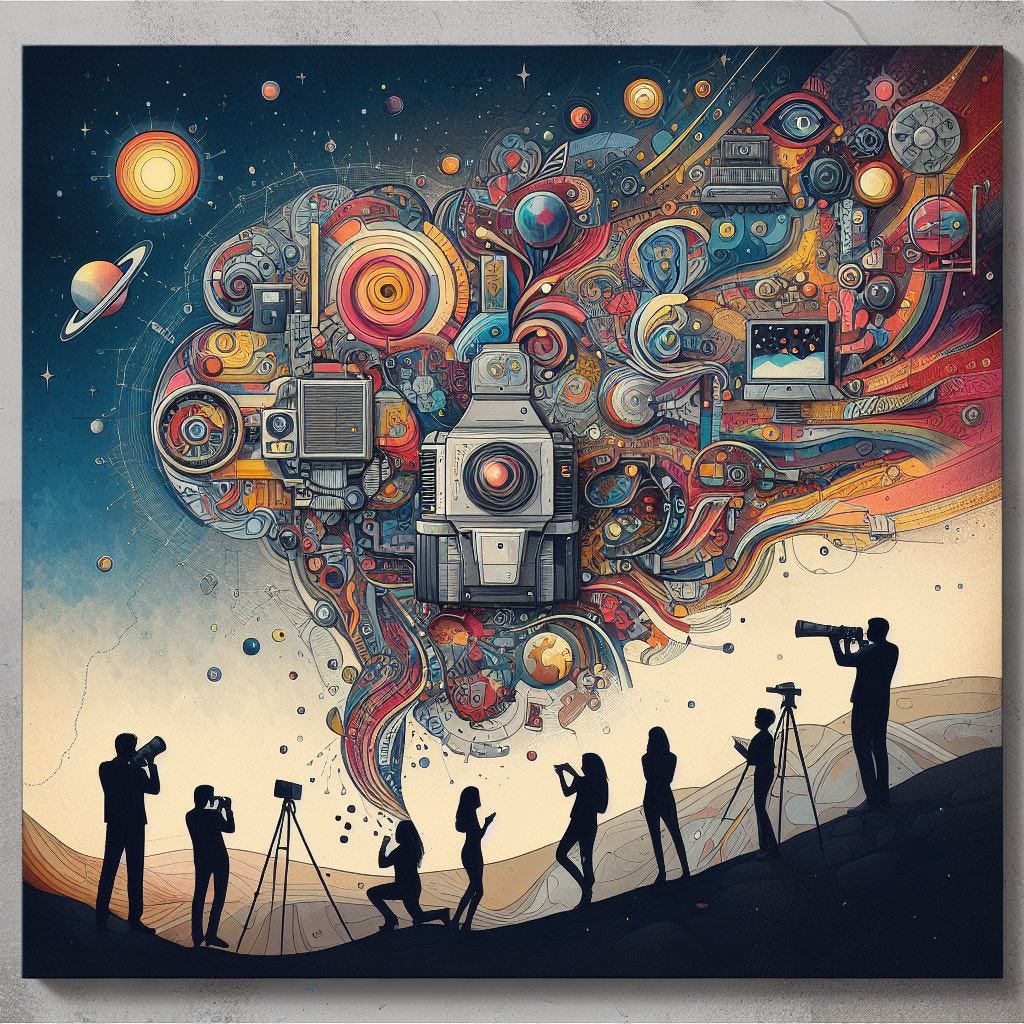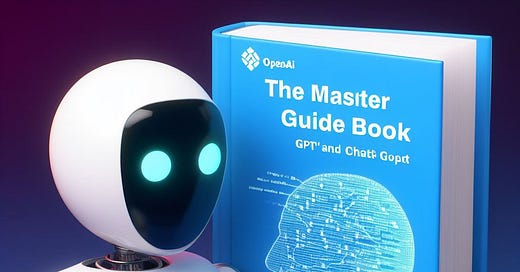
The AI Revolution Marches On: Chatbots, Robots, and Brain Decoding Advances
Chatbots, Robotics, Brain Decoding: Inside the Rapid Evolution of AI - OpenAI, Anthropic, Meta and more unveil new research as experts urge caution on AI's societal impacts.
The artificial intelligence landscape continues to rapidly evolve, with major players like OpenAI, Anthropic, Meta, and others unveiling new capabilities and research almost weekly. While AI has made incredible strides, debates rage about potential dangers and whether we’re moving too fast without proper safeguards. Still, the momentum seems unstoppable, with AI now powering everything from creative tools to chatbots to warehouse robotics. Here’s a look at some of the latest happenings in this fast-moving space.
OpenAI Ditches Controversial AI Model
OpenAI, the research company behind ChatGPT and other popular AI applications, announced this week that they have halted development on a new AI system called Arus. Arus, named after the desert planet from the sci-fi book and movie Dune, was designed to power chatbots like ChatGPT using much less computing power. However, OpenAI said the model was not meeting expectations around efficiency and usefulness, so they’ve shelved it indefinitely.
OpenAI has been cagey about details on Arus, likely because their AI models spur so much controversy given abilities to automate human skills and output potentially dangerous information if not properly constrained. But based on comments from CEO Sam Altman, it seems Arus may have had issues with generating coherent, factually accurate information.
While Arus joins the dustbin of discarded AI models, OpenAI continues work on even more advanced systems they claim will usher in the next era of AI. However, many leading experts argue we need public debate and stronger oversight before unleashing AI technologies with possibly profound societal impacts.
Anthropic’s Claude AI Now Accessible to Millions More Users
In more positive AI news, San Francisco startup Anthropic announced a major expansion of availability for its AI assistant Claude. Claude, considered one of the top AI chatbots behind ChatGPT, can now be accessed by users in 95 different countries.
Claude impressed beta testers with its ability to summarize long articles, have nuanced conversations, and outperform competitors in generating helpful content without hallucinating information. Users particularly praise Claude’s contextual prowess in following complex multi-part conversations.
Anthropic touts strict internal controls to curb potential dangers with generative AI. But widened Claude access still raises concerns of how such bots might be misused at scale. Anthropic stresses Claude has built-in safeguards against harmful uses and will continue aggressive monitoring. Still, experts say Anthropic and peers must remain vigilant as AI capabilities grow more formidable.
Major Music Company Sues Anthropic Over Song Lyrics
However, Anthropic now faces a major legal battle that could determine what types of content AI systems can actually produce. Industry giant Universal Music Group filed a lawsuit alleging Anthropic illegally distributes copyrighted song lyrics through Claude.
The music conglomerate claims if a user prompts Claude to provide lyrics to a copyrighted song, it will generate the full lyrics without authorization. Universal asserts this kind of AI-enabled piracy threatens creators and companies who own intellectual property rights.
Anthropic will likely argue Claude is simply responding to user prompts, much like a search engine produces links to content it doesn’t own. Tech companies have gained broad protections from copyright claims related to material users post or access through their platforms. But the waters remain murky when an AI produces its own original content derivate of copyrighted works.
The high-stakes case could ultimately help reshape copyright laws for our increasingly AI-driven era. If Universal prevails, experts warn it could have a chilling effect on AI development and availability of knowledge through conversational systems.
New Web Search Capabilities Give Pi Chatbot an Edge
While Claude expands its user base, a top competitor just acquired new talents that could help it pull ahead of the pack. Pi, an AI chatbot created by startup Inflection, can now search the internet to provide users the most up-to-date information.
Previously, Pi could only access its own curated database when answering user questions. But harnessing web search gives Pi access to an exponentially larger trove of data, allowing it to provide fresher info on trending topics and current events.
During a demo, Pi precisely answered a question about who won a highly publicized boxing match between YouTuber Jake Paul and MMA fighter Dillon Danis just two days after the event. This real-time knowledge could give Pi an advantage over rival chatbots slow to update their databases. It might also raise moderation challenges as Pi gains wider access to content across the web.
Chatbot Sector Still Lags in Transparency, Accountability
Speaking of chatbot companies, a team of Stanford researchers released their first “Foundation Model Transparency Index” evaluating and ranking major players on openness about their AI systems. The index assessed 10 chatbots from leading tech firms on 100 transparency indicators including ethics, safety, and technical details.
Meta's BlenderBot 2.0 ranked highest in transparency, with Anthropic also scoring well but lagging rivals in some disclosure areas. Worryingly, tech giants Amazon and Baidu scored lowest overall, signaling a lack of accountability as they rapidly develop and deploy conversational AI products.
The researchers conclude chatbot makers must learn from peers and proactively embrace transparency standards that build public trust. But absent regulations, transparency remains voluntary, with companies like Meta so far doing more to market safety than implement meaningful accountability measures.
Baidu Claims New Chatbot Rivals Performance of OpenAI's Cutting-Edge GPT-4
Chinese tech firm Baidu made waves this week by declaring its new Ernie chatbot matches GPT-4, OpenAI’s highly anticipated next-generation language model yet to be released. Baidu showed off Ernie’s conversational abilities at a conference, claiming it’s neck-and-neck with GPT-4 based on internal testing.
Baidu says Ernie excels at understanding context, logical reasoning, and knowledge retention, enabling remarkably human-like dialogue. The company aims to make Ernie publicly accessible soon, though did not provide an exact timeline.
As the AI arms race accelerates between the US and China, Baidu’s assertions underscore China’s advancements in cultivating homegrown AI. However, without transparency into Ernie’s inner workings or public testing, Baidu’s claims of achieving parity with GPT-4 remain difficult to independently verify.
US Slams Brakes on AI Chip Exports to China
Shifting gears to AI hardware, the US government recently imposed aggressive new restrictions on exporting advanced AI chips to China. Nvidia and Advanced Micro Devices, two leading makers of graphics processing units vital for AI, had been selling special versions of their chips to China that complied with past export controls.
But after declaring China a national security threat, the Biden administration outlawed exports of all high-end AI chips, closing loopholes companies exploited to maintain this lucrative market. AMD and Nvidia stocks subsequently plummeted on the news.
US officials argue the extreme measures are necessary to prevent China from using AI chips to enhance surveillance systems or military capabilities. But critics see it as a risky attempt to undermine China’s technical prowess that could provoke retaliation against American companies and derail international AI cooperation. The escalating AI chip war between superpowers may only have losers, they argue.
Capitalizing on AI Artistic Talent Through Stock Photography Sites
While AI debates rock the political world, everyday users continue finding creative ways to harness generative AI in their lives. One innovative option is leveraging sites like Wirestock.io to actually earn money from AI-generated images.
Wirestock lets users easily submit computer-created images to major stock photo platforms, with the site handling all the processing, tagging, descriptions and licensing required. Wirestock's Discord bot even lets creators generate custom images tailored to in-demand stock photography themes and niches.
Top stock image platforms like Shutterstock, Adobe Stock, and iStock now accept AI art as long as it's labeled appropriately to inform buyers. So services like Wirestock open new income streams for artists skilled at guiding AI tools, with the potential to earn thousands in passive income.
Of course, human photographers argue AI art devalues their work by flooding the market with computer-generated imitation. But with genie out of the bottle, stock photo platforms are figuring out how to carefully integrate AI content to meet buyer demand.
Midjourney Officially Launches Website Allowing Broader Access
Wirestock leverages Midjourney, one of the leading AI art generators exploding in popularity in recent months. This week, Midjourney unveiled its long-awaited official website, moving beyond its current Discord-only access.
The sleek site provides an overview of capabilities, pricing, and a showcase of stunning AI creations. For now, image generation still happens exclusively through Discord, with plans to integrate that functionality into the website over the next couple months.
Midjourney also partnered with gaming company Sizigi to launch Img2Img capabilities in new apps for iOS and Android. This allows smartphone users to easily generate AI images on the go.
Between the website, mobile apps, and new premium subscription model, Midjourney aims to make AI art creation more accessible to casual users overwhelmed by Discord. However, concerns persist about harmful content reaching broader audiences absent proper oversight.
YouTuber Trains AI to Master Pokemon Using Reinforcement Learning
Beyond the arts, AI researchers and hobbyists continue finding fascinating ways to apply AI across industries and domains. One amusing example that went viral recently is a YouTuber training AI to excel at playing Pokemon through trial-and-error reinforcement learning.
The creator used software enabling multiple instances of the classic Game Boy version of Pokemon to run at once. The AI agents earned points for actions like winning battles and discovering new areas, with the best performers "surviving" to replicate and improve on their success.
Over time, the AI learned highly skilled Pokemon strategies far surpassing human play. By the end, it completed the game faster than any human ever has. Beyond entertainment, the project reveals AI’s potential to master complex real-world skills when properly incentivized.
Concerningly, it also demonstrates how AI could become unstoppable at harmful real-world activities like hacking if set up with the wrong rewards and motivations.
Stack Overflow Lays Off Hundreds as Coding Sites Feel AI Chatbot Heat
In one worrying sign of AI’s disruption of white-collar work, coding question-and-answer platform Stack Overflow laid off over 100 employees this week, about 28% of staff. The firm attributed the cuts to plummeting traffic as software engineers increasingly turn to AI coding assistants rather than crowdsourced human help.
Tools like GitHub Copilot and Amazon CodeWhisperer now provide automated support as developers write code, reducing reliance on sites like Stack Overflow. And chatbots like ChatGPT can simply generate code directly from natural language prompts.
While AI coding assistants hold great promise in unlocking human productivity and innovation, they threaten the livelihoods of flesh-and-blood programmers and allied professions. Critics argue tech companies are recklessly rushing to roll out AI before policymakers institute safeguards for displaced workers.
YouTube Leveraging AI to Maximize Ad Targeting
Besides automating jobs, AI is transforming how ads target you across the web and delivering marketers ever more granular access to your interests. The latest example is YouTube rolling out a new “Cultural Moments targeting” feature for advertisers.
Powered by machine learning, it analyzes videos in real-time to identify viral cultural trends like challenges, events, or holidays. Advertisers can then insert ads into topical non-related videos AI predicts are discussing that cultural moment.
YouTube touts Cultural Moments as helping users discover products and brands relevant to what’s unfolding in the cultural zeitgeist. But it also expands data gathering on users and raises accountability questions around AI manipulating consumer behavior.
Leading Audio Editing App Integrates Powerful New AI Features
Shifting to revolutionary changes in media creation tools, top audio editor Descript this week unveiled new AI capabilities that are music to content creators’ ears.
Descript introduced AI Voices that can clone anyone’s voice with just a short sample, eliminating the need for costly voice actors when creating videos or podcasts. The new text-to-speech voices also sound far more natural according to early reviews.
And Descript’s new speech enhancer tool applies next-level AI to not just transcribe audio but actually edit it, allowing adjusting not just text but cadence, tones and emotional nuances. Early adopters call it nothing short of magic.
These latest AI trends may just be the tip of the iceberg. With such exponential change, experts debate how much control we retain over AI’s trajectory versus surrendering to a future largely outside human hands. But the adventure promises excitement either way.



















